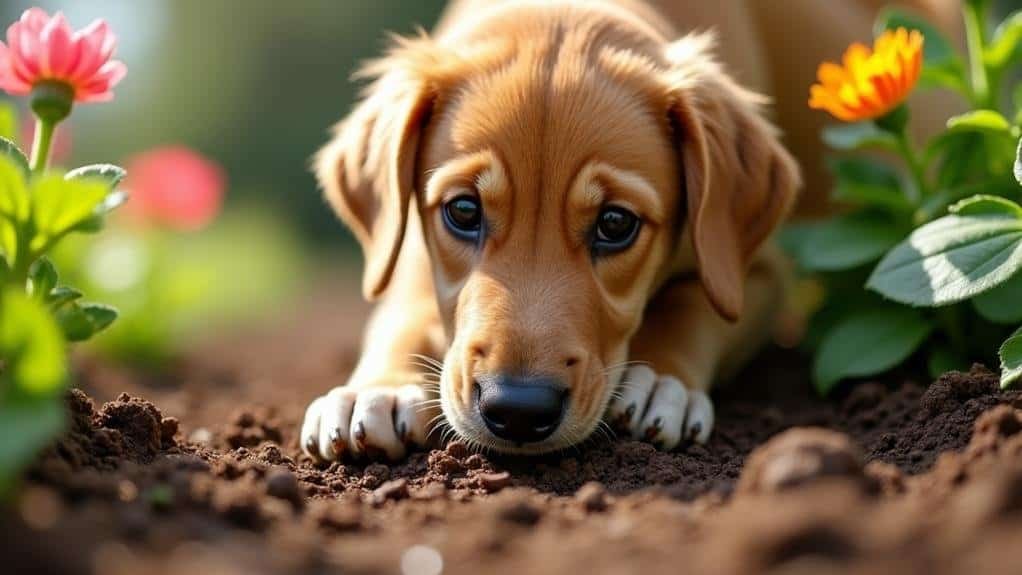Your dog’s dirt-eating habit may have several causes.
Nutritional deficiencies could drive them to seek minerals in soil, while gastrointestinal discomfort might lead to dirt consumption for relief.
Boredom or anxiety can also trigger this behavior as a coping mechanism.
Some dogs explore their environment through taste, especially puppies.
In some cases, it may be a sign of pica, a condition causing the compulsive ingestion of non-food items.
While occasional dirt eating isn’t usually harmful, frequent consumption can pose health risks.
Understanding the underlying reasons can help you address this peculiar habit and guarantee your furry friend’s well-being.
Nutritional Deficiencies and Mineral Seeking
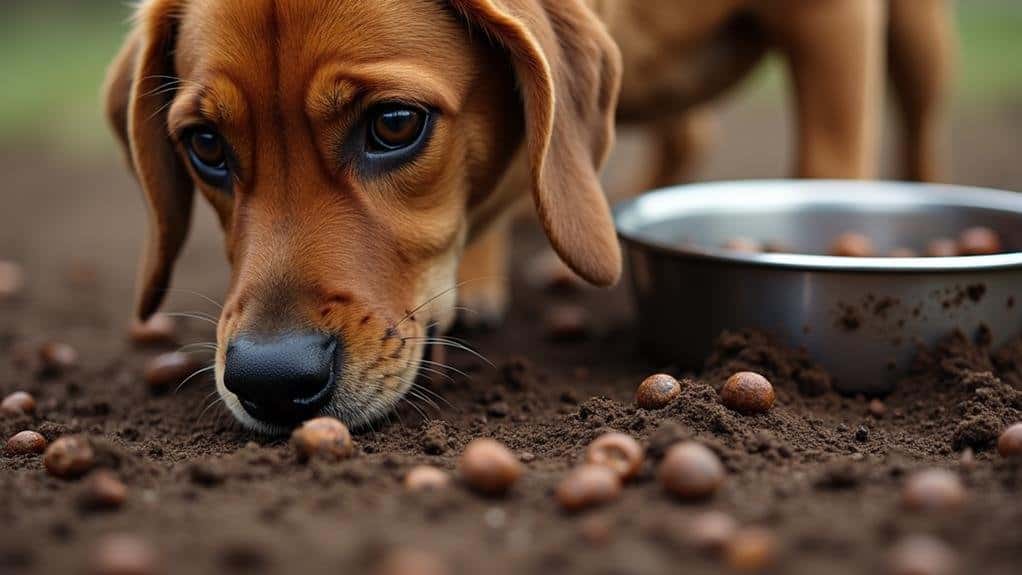
One of the primary reasons dogs eat dirt is due to nutritional deficiencies and mineral seeking.
If your dog’s diet lacks essential minerals like iron, calcium, or trace elements, they may instinctively turn to dirt as a source of these nutrients.
This behavior is often a sign of a nutritional imbalance in their regular food.
Low-quality dog foods are particularly problematic, as they may not provide all the necessary nutrients your pet needs.
As a result, your dog might resort to eating dirt to compensate for what’s missing in their diet.
This natural instinct to seek out essential minerals can lead them to consume soil, which sometimes contains elements like sulfur.
It’s important to note that certain medical conditions, such as gastrointestinal issues or anemia, can affect your dog’s ability to absorb nutrients properly. These conditions may trigger dirt-eating behavior as your pet attempts to address the deficiency.
To prevent this habit and guarantee your dog’s nutritional needs are met, schedule regular veterinary check-ups.
Your vet can identify any nutritional imbalances and recommend appropriate dietary adjustments, helping to curb your dog’s dirt-eating tendencies.
Behavioral Factors and Boredom
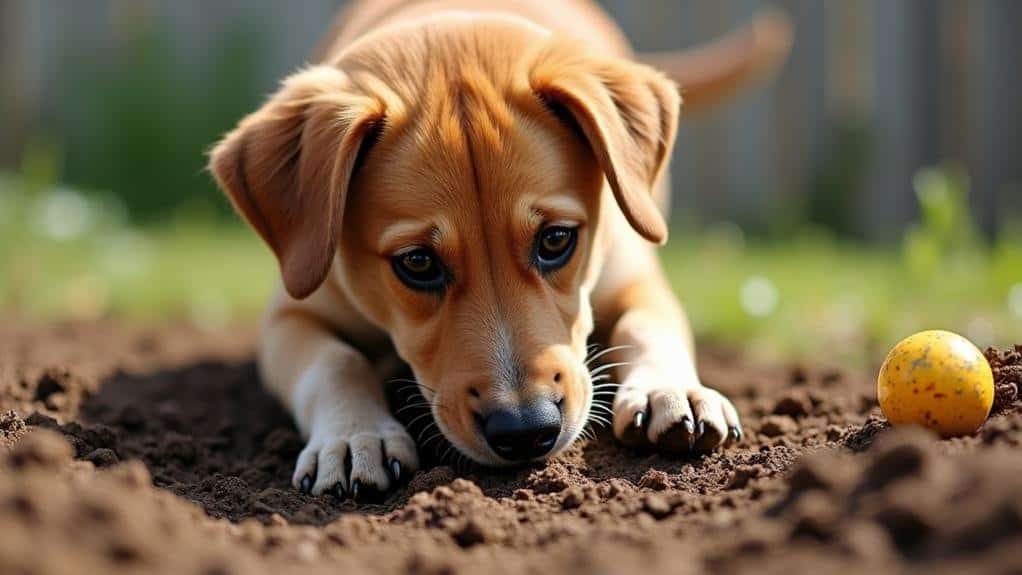
While nutritional deficiencies play a significant role in dirt-eating behavior, behavioral factors and boredom are equally important contributors. Your dog may turn to eating dirt as a way to alleviate boredom or cope with anxiety.
When dogs lack mental stimulation or physical exercise, they often seek alternative activities to fill their time, and dirt consumption can become an appealing option.
Behavioral factors influencing dirt-eating include:
- Innate exploration instinct
- Social learning from other animals
- Displacement action due to anxiety
- Lack of mental and physical stimulation
- Seeking attention from owners
If you’ve noticed your dog eating dirt, it’s essential to reflect on their environment and daily routine.
Are they getting enough exercise and mental stimulation? Dogs with pent-up energy or those left alone for extended periods may resort to dirt-eating as a coping mechanism.
Additionally, your dog’s natural instinct to explore their surroundings can lead to tasting various substances, including dirt.
Social learning also plays a role, as dogs may mimic the behavior of other pets in the household.
Gastrointestinal Discomfort and Relief
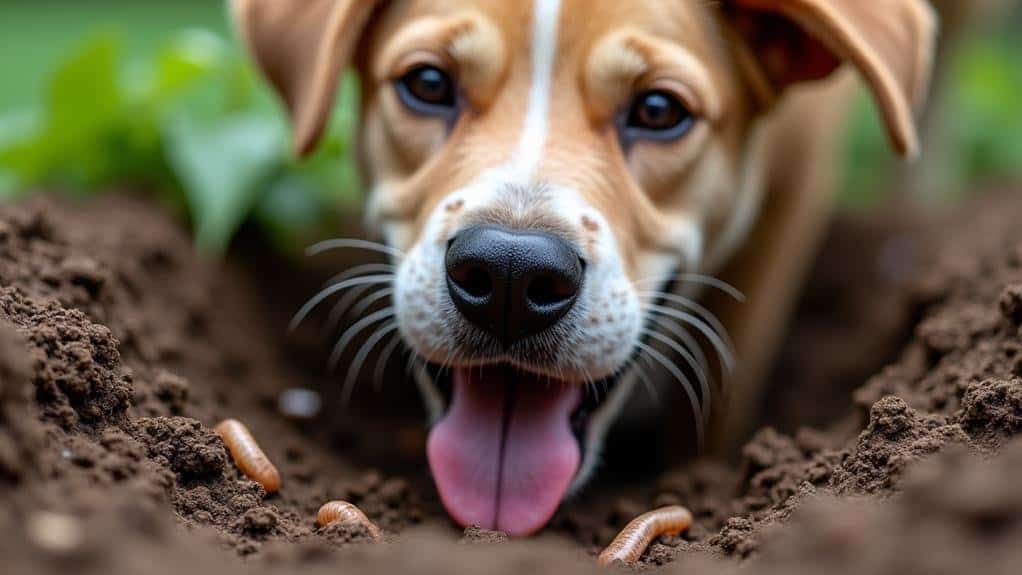
A dog’s instinct to eat dirt often stems from gastrointestinal discomfort. When your furry friend is experiencing an upset stomach, they may turn to dirt as a way to alleviate their discomfort. This behavior isn’t just random; it’s rooted in their instinctual drive to find relief from digestive issues.
Dogs eating dirt may be trying to induce vomiting, which can provide temporary relief from stomach upset. The texture and composition of dirt can trigger this response, and your dog might associate the act with feeling better afterward. This behavior is particularly common in dogs suffering from conditions like gastritis or inflammatory bowel disease (IBD).
You might notice your dog ingesting dirt while eating grass, another common response to gastrointestinal problems. As they nibble on grass to soothe their stomach, they may inadvertently consume dirt in the process.
It’s essential to monitor your dog’s behavior closely, as persistent dirt eating could indicate underlying gastrointestinal issues that require veterinary attention. If you observe this habit frequently, it’s best to consult with your vet to rule out any serious health concerns and guarantee your dog’s well-being.
Pica Behavior in Dogs
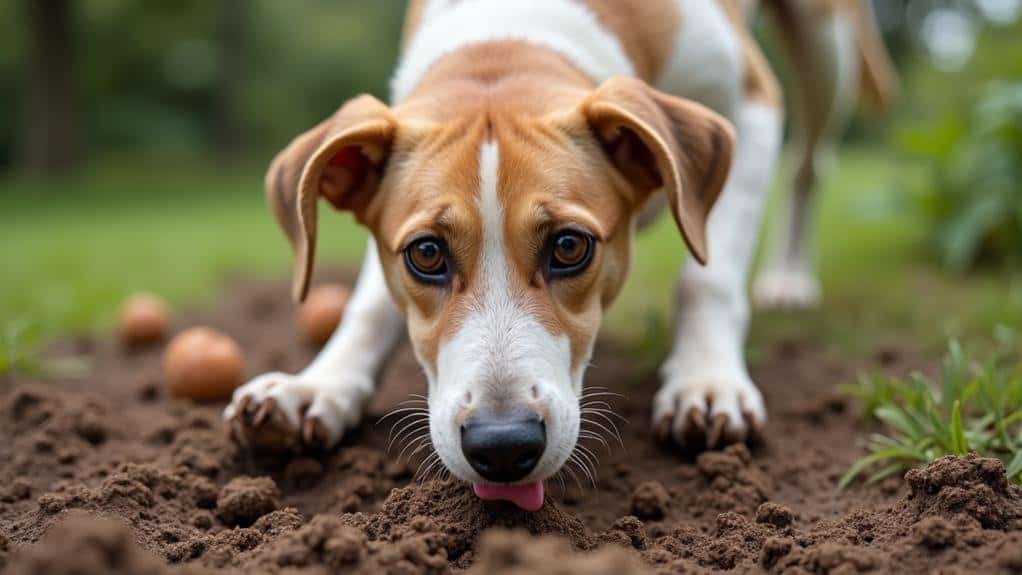
Pica behavior in dogs can be a perplexing and concerning issue for pet owners. This compulsive ingestion of non-food items, including dirt, often indicates underlying nutritional deficiencies, gastrointestinal issues, or behavioral problems.
If you’ve noticed your dog eating dirt, it’s vital to understand that this behavior isn’t just a quirky habit but could be a sign of more serious issues.
Pica in dogs can stem from various factors:
- Nutritional deficiencies, leading dogs to seek minerals from soil
- Stress, anxiety, or boredom as coping mechanisms
- Social learning from observing other animals
- Gastrointestinal discomfort or underlying medical conditions
- Learned behavior reinforced over time
You should be aware that persistent dirt-eating can pose health risks to your pet.
It’s important to consult a veterinarian if you notice this behavior becoming frequent or compulsive. They can help rule out medical conditions and suggest appropriate dietary adjustments or behavioral interventions.
Environmental Exploration and Curiosity
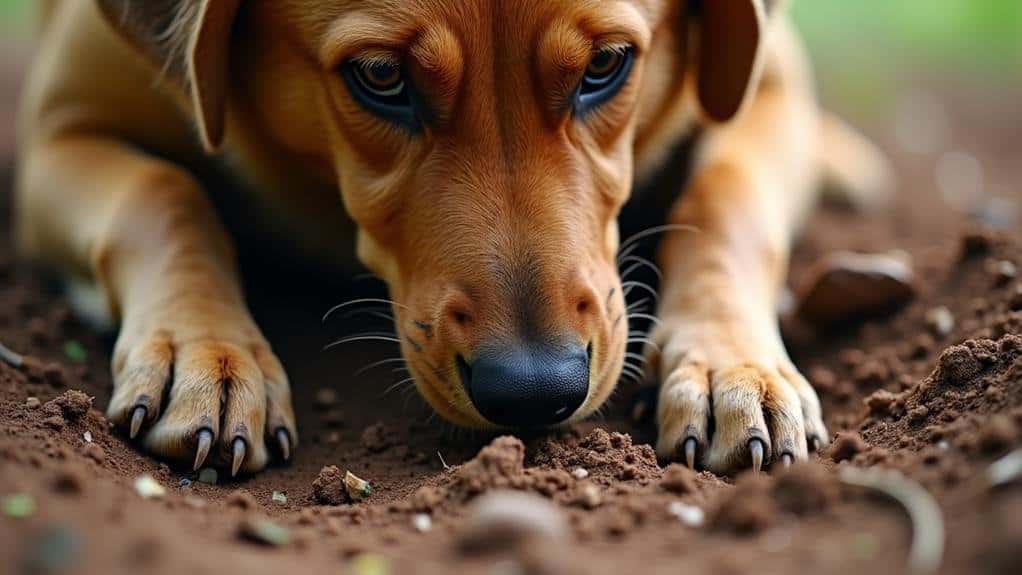
One of the most common reasons dogs eat dirt is simply their innate curiosity and desire to explore their environment. Your canine companion’s natural instinct to investigate their surroundings often leads them to use their senses of taste and smell, which can result in dirt consumption.
This behavior is a form of environmental exploration that allows dogs to engage with their world and satisfy their inquisitive nature.
Dogs’ powerful olfactory senses play a significant role in their curiosity about dirt. They’re drawn to the various scents present in soil, which can inadvertently lead to ingestion.
Puppies, in particular, are prone to this exploratory behavior as they learn about their environment through their mouths.
You might notice your dog mimicking other animals or pets that engage in similar dirt-eating behaviors, reinforcing their own exploration.
This social learning can contribute to the habit of consuming soil. Understanding that your dog’s dirt-eating may be driven by curiosity and environmental exploration can help you address the behavior appropriately, ensuring your pet’s safety while still allowing for natural investigative tendencies.
Health Risks of Dirt Consumption
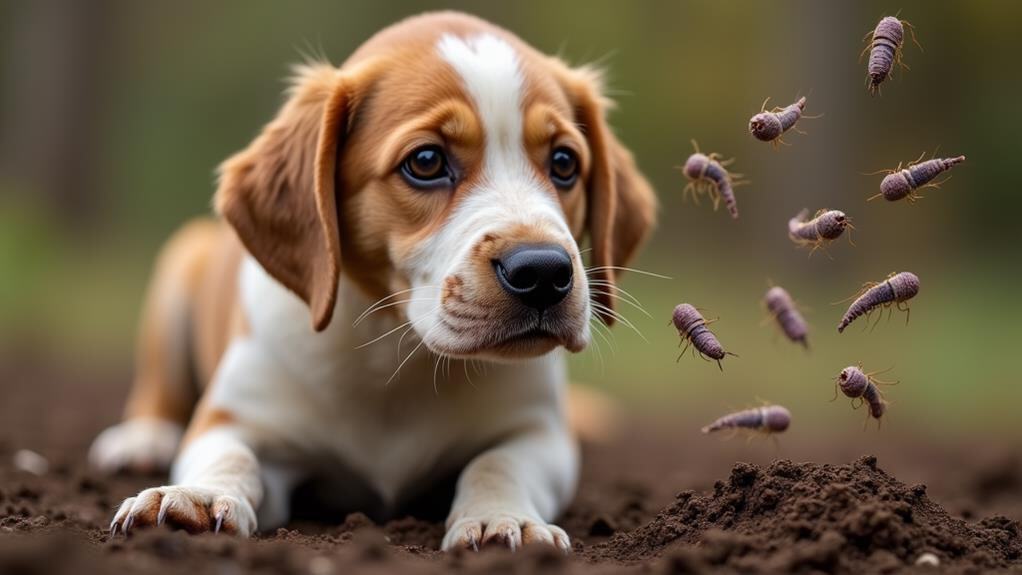
Despite the seemingly harmless nature of dirt, its consumption by dogs can lead to a range of serious health risks. When your furry friend ingests soil, they’re exposing themselves to potential dangers that can greatly impact their well-being.
One of the most concerning health risks is the possibility of gastrointestinal blockages. If your dog consumes a large amount of dirt, it can cause impaction, potentially requiring surgical intervention.
Additionally, dirt often contains harmful chemicals like pesticides and fertilizers, which can lead to toxicity and severe health complications.
Your dog’s dirt-eating habit also increases their risk of exposure to intestinal parasites lurking in the soil. These parasites can cause infections and other health issues if they enter your pet’s system.
Here are five additional health concerns associated with dirt consumption:
- Abrasions and inflammation in the gastrointestinal tract
- Choking hazards from foreign objects mixed with dirt
- Punctures in the mouth and digestive lining
- Exposure to harmful bacteria and pathogens
- Nutritional imbalances due to excessive dirt intake
Preventing Dirt Eating Habits
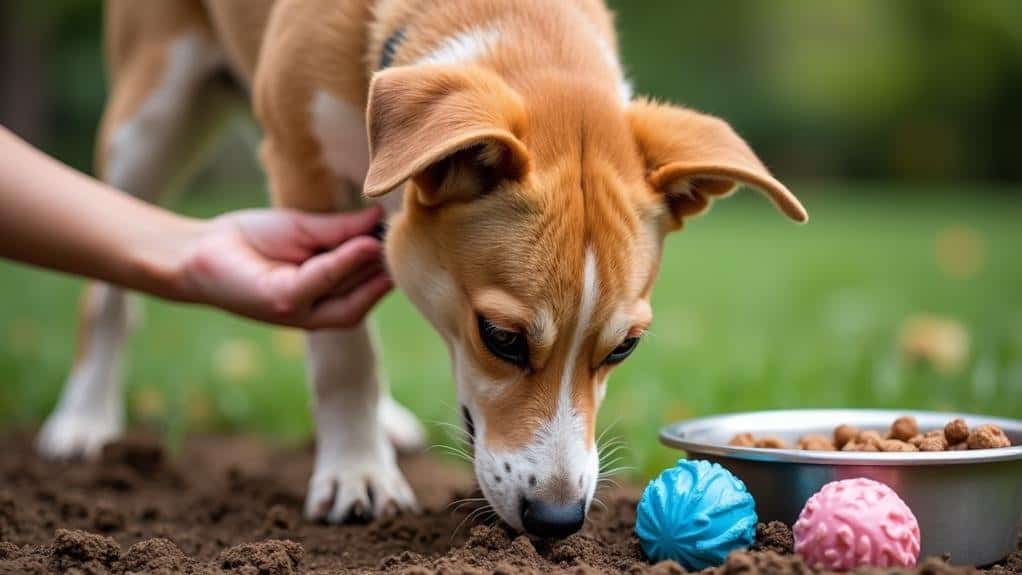
Vigilant dog owners can take proactive steps to prevent their furry friends from developing dirt-eating habits. One of the most effective ways to prevent them from eating dirt is by ensuring proper nutrition. Providing a balanced, high-quality diet can eliminate nutritional deficiencies that may drive your dog to seek out dirt as a supplement.
Regular exercise and mental stimulation are essential in reducing boredom and anxiety-driven dirt eating behaviors. Engage your dog with interactive toys and daily walks to keep them physically and mentally satisfied.
Supervising outdoor activities and limiting access to areas where dirt is prevalent can also help curb this behavior.
Teaching basic commands and using redirection techniques can effectively manage and modify your dog’s dirt eating habits. When you notice your pet showing interest in dirt, redirect their attention to a more appropriate activity or toy.
If the behavior persists, consult with a veterinarian for a dietary assessment and behavioral evaluation. They can help identify any underlying health issues and provide tailored advice to address your dog’s specific needs, ensuring overall canine health and well-being.
When to Consult a Veterinarian
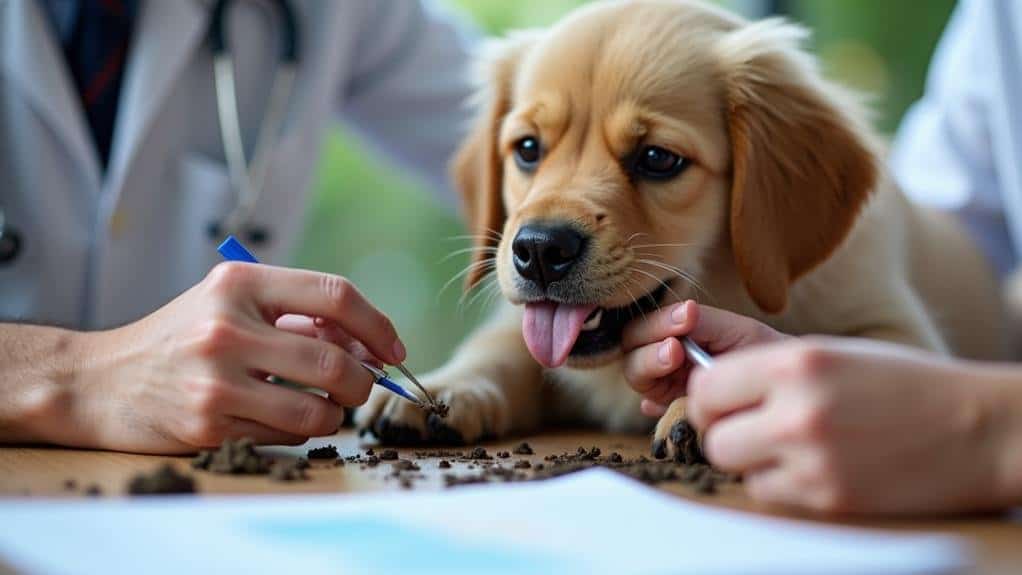
While preventive measures are important, there are times when professional medical advice becomes necessary. If you notice your dog frequently eating dirt, it’s essential to consult a veterinarian to rule out underlying medical conditions. This behavior may indicate gastrointestinal disorders or nutritional deficiencies that require professional attention.
Be vigilant for changes in your dog’s behavior or stool consistency after consuming dirt. These changes should prompt an immediate visit to the veterinarian for evaluation and potential diagnostic testing. Persistent dirt eating, especially when accompanied by symptoms like vomiting, diarrhea, or lethargy, demands professional care to prevent further health complications.
Regular veterinary check-ups are vital for monitoring your dog’s overall health and addressing any dietary or behavioral concerns that may lead to dirt eating. If your dog shows signs of distress or discomfort related to dirt consumption, consulting a veterinarian can provide insights into appropriate interventions and treatment options.
Consider consulting a veterinarian when:
- Your dog eats dirt frequently
- You notice changes in behavior or stool consistency
- Dirt eating is accompanied by other symptoms
- You’re concerned about nutritional deficiencies
- Your dog shows signs of distress after consuming dirt
Frequently Asked Questions
What Minerals Are Dogs Lacking When They Eat Dirt?
Your dog might be lacking essential minerals like calcium, iron, and sodium when it eats dirt. It’s also possible they’re deficient in trace minerals such as sulfur. You’ll want to consult your vet to identify specific deficiencies.
Why Is My Dog Eating Dirt and Soil?
Your dog’s dirt-eating habit could stem from nutritional deficiencies, digestive issues, or behavioral factors. It’s crucial to evaluate their diet, health, and environment. If you’re concerned, consult your vet to rule out underlying problems.
What Is It Called When Dogs Eat Dirt?
When your dog eats dirt, it’s called “pica.” This term describes the consumption of non-food items. It’s a behavior you should monitor, as it can indicate nutritional deficiencies, boredom, or health issues in your furry friend.
Why Do Dogs Eat Clumps of Grass and Dirt?
Your dog may eat clumps of grass and dirt due to natural curiosity, nutritional deficiencies, or gastrointestinal discomfort. It’s also a potential sign of boredom or anxiety. Monitor this behavior, as it could indicate underlying health issues requiring veterinary attention.
Conclusion
You’ve learned that dogs eat dirt for various reasons, from nutritional deficiencies to behavioral issues.
While it’s often harmless, it can pose health risks. Keep your dog engaged, provide a balanced diet, and address any underlying health concerns.
f the behavior persists or you’re worried, don’t hesitate to consult your vet.
By understanding and addressing the root cause, you’ll help your furry friend stay healthy and dirt-free.

